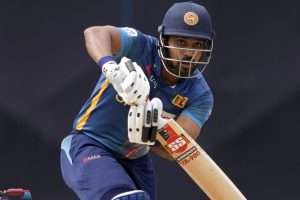For many South Asians, cricket is life. Even at times when the national team is underperforming, and in the case of Sri Lanka the team has been failing for years, people tune in to watch matches, putting all else aside.
Cricket matches are widely seen in South Asia as tests of national superiority, and cricketers are national heroes, who enjoy a cult-like following.
So revered are cricketers and coaches of winning teams that they are bestowed with honors, awarded to the best and brightest of the land.
In 2014, Sachin Tendulkar was awarded the Bharat Ratna, India’s highest civilian award. Sri Lanka’s 1996 World Cup-winning captain Arjuna Ranatunga was awarded the title Deshamanya, Sri Lanka’s second-highest national honor, while Dav Whatmore, the coach of the team, received the Sri Lanka Ramya, an honor given to foreigners or non-nationals.
Likewise, Pakistan’s Imran Khan received the Hilal-e-Imtiaz, the second-highest civilian award, for winning the 1992 World Cup. Javed Miandad, Inzamam-ul-Haq, Mohammad Yousuf, Younis Khan, and Shahid Afridi are among the cricketers who have have been awarded the Sitara-e-Imtiaz, the third-highest civilian award in Pakistan.
Unfortunately, the prestige and popularity South Asian cricketers enjoy have resulted in fans defending them even when they are accused of horrific crimes, including sexual assault. They seem to think they are above the law.
A recent example is that of Sri Lankan cricketer, Danushka Gunathilaka, who was arrested in Australia in 2022 on charges of sexual assault while he was in Sydney for the T20 World Cup. Gunathilaka pleaded not guilty and will stand trial in Australia.
Gunathilaka is said to have met a 29-year-old woman on Tinder on October 29 of last year, and then engaged in “‘forceful’ sexual intercourse with the woman, allegedly choking her three times… Police say the woman was ‘clear’ that she did not consent to sex without a condom or to sex with choking.”
In May, the public prosecutor dropped three of the four sexual assault charges against him. The remaining charge is that Gunathilaka engaged in forceful sexual intercourse, during which he allegedly “put one hand around [the woman’s] neck for 20 to 30 seconds and choked her.”
This is not the first time Gunathilaka has been accused of sexual assault. There were at least three allegations against him over “unwanted advances to women” before the 2022 incident in Australia.
Gunathilaka has also been suspended from playing several times for breaching team protocols. ESPN reported that Gunathilaka was “suspended for an indifferent attitude towards training in 2017 and violating curfew in the middle of a Test in 2018.”
In June 2021, Sri Lanka Cricket (SLC) suspended Gunathilaka along with teammates Niroshan Dickwella, and Kusal Mendis over breaching the team’s bio-secure bubble in Durham at the height of the COVID-19 pandemic. The team was on a tour of England and officials of both countries had advised players not to visit Durham’s City Centre. However, a cricket fan caught them on video in the City Centre without masks, probably drunk, and smoking.
Well-known Sri Lankan sports journalist Rex Clementine reported that “an independent panel headed by a retired judge last year found all three players guilty of breaching the bio-secure bubble and recommended two-year bans from the sport.” However, the SLC Executive Committee decided to reduce the suspensions to one year each, and in less than six months, in January 2022, the SLC decided to lift the ban on the players following an appeal.
Ironically, if the SLC had not lifted the ban, Gunathilaka would not have gone on that fateful tour to Australia.
Meanwhile, in Nepal, 22-year-old leg-spinner, Sandeep Lamichhane was accused and arrested of raping a 17-year-old woman in August 2022. Although he could face a prison term of 10 to 12 years if convicted, the Cricket Association of Nepal has revoked his suspension following his release on bail in January 2023.
Lamichhane went on to play against Scotland and Namibia in the Cricket World Cup League 2 tri-series, where Scottish players refused to shake his hand following their match. Namibian cricketer fist-bumped Lamichhane, instead of the customary post-match handshakes.
The playing 11 of a cricket team carry the hopes of an entire nation.
As noted Indian sociologist Ashis Nandy observed in “The Tao of Cricket: On Games of Destiny and the Destiny of Game,” for the “uprooted, humiliated, decultured Indian,” a victorious cricket team becomes “the ultimate remedy for all the failures — moral, economic and political — of the country.” We can probably insert any South Asian nationality in place of “Indian” here.
For this we have afforded cricketers privileges and are willing to look the other way when they indulge in transgressions, or even serious crimes.
Fans take the perceived slights and hurt feelings of players very seriously. Millions of fans are mobilized on social media to defend their favorite cricketer. For instance, there are thousands of people who still insist that Gunathilaka was set up. Many fans have asked the SLC to do more to assist Gunathilaka, and wealthy Sri Lankans in Australia are apparently assisting the cricketer. Sri Lanka’s Daily Mirror reported that it was a Sri Lankan woman who lives in Melbourne who paid 150,000 Australian dollars to bail him out. Daily Mirror said that “the connection the cricketer has to this female or whether she is simply a fan is yet to be disclosed.”
Several South Asian cricketers hobnob with political and business elites. This opens doors to those who can get them out of trouble.
The cricketers themselves are well aware of the power of their fans and that their connections with the elites place them beyond law, at least when they are in the subcontinent. And it seems that cricketing elites, very much like our political elites, are taking advantage of the devotion of their mobs of fans to get away with bending the law.

































